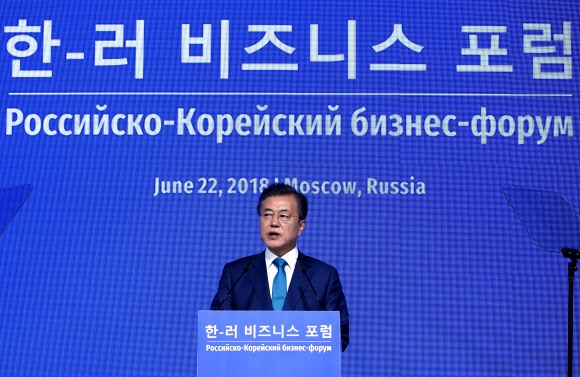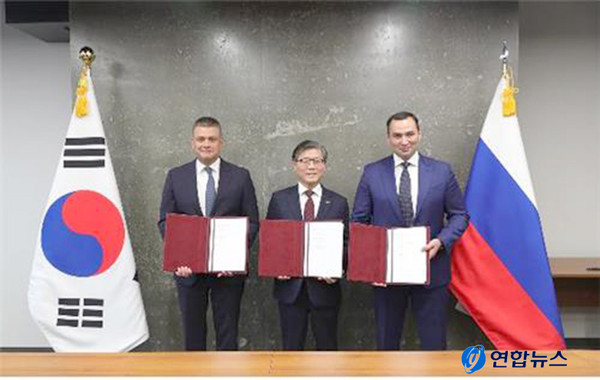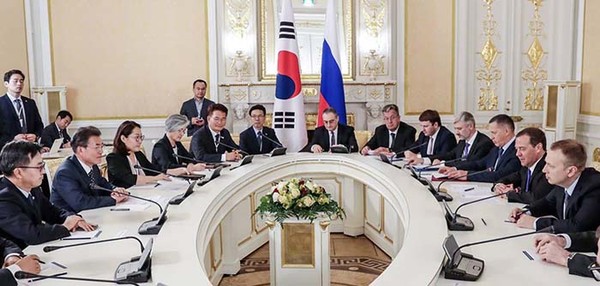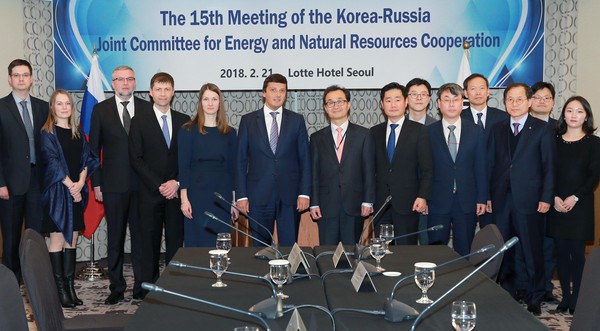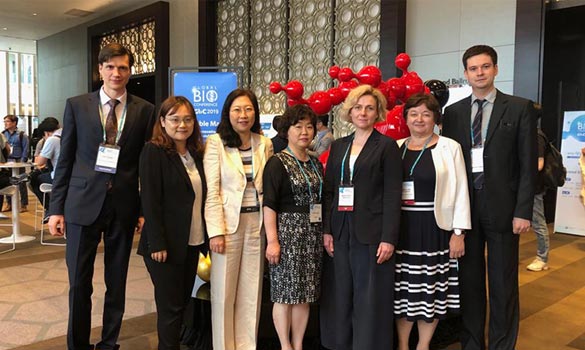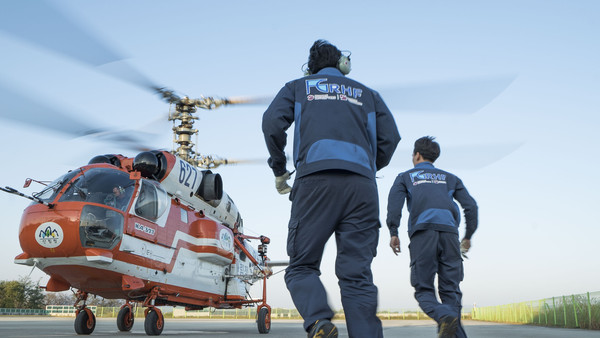Discloses Ambassador Kulik of Russia in Seoul at an interview with 'The Korea Post'
By Publisher Lee Kyung-sik with Special Feature Editor Kim Hyung-dae
This year, the Republic of Korea and the Russian Federation celebrate the 30th anniversary of their diplomatic relations since the two countries singed the agreement on Sept. 30, 1990. Cooperation and friendship between the two countries are growing by leaps and bounds, especially after the inauguration of President Moon Jae-in Korea who takes special interest in the promotion of relations and cooperation with Russia. At this juncture The Korea Post media, publisher of 3 English and 2 Korean news publications for the past 35 years conducted an exclusive interview with His Excellency Ambassador Andrey Kulik of the Russian Federation in Seoul. Excerpts from the interview follow:
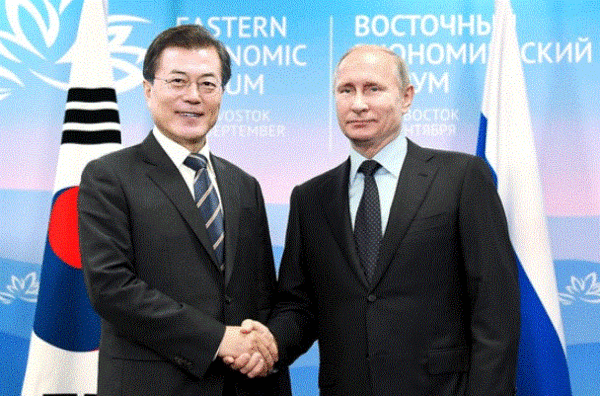
Question 1: What are the important developments scheduled between the Russian Federation and the Republic of Korea, including high level visits?
Answer: The year 2020 is significant for diplomatic relations between Russia and Korea: on September 30 we will mark the 30th anniversary of their establishment.
According to the Joint Statement adopted at Moscow summit on June 22, 2018 between Russian President Vladimir Putin and President of the Republic of Korea Moon Jae-in who was on a state visit to Russia the two sides agreed to organize The Year of Mutual Exchanges in linkage with the jubilee of the bilateral diplomatic relations. Unfortunately, due to the outbreak of COVID-19 the opening ceremony of the Year was postponed. We hope to conduct it after the epidemic situation is stabilized.
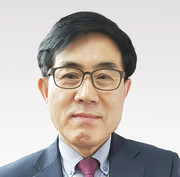
Besides, ministries of culture of our two countries plan to hold the Year of Cultural Exchanges that will pass the torch to the ‘Russian Seasons’ International Festival on the Korean Peninsula in 2021.
As for high level meetings, I should mention that President V. Putin during the summit in Moscow on June 22, 2018 received the invitation from President Moon Jae-in to pay a visit to Korea at a convenient time. President Moon Jae-in has been invited to participate in commemoration of the 75th anniversary of the Victory in the Great Patriotic War in Moscow. But the epidemic situation has forced to make adjustments to plans of bilateral contacts. The both sides will continue to coordinate the timing of possible future visits.
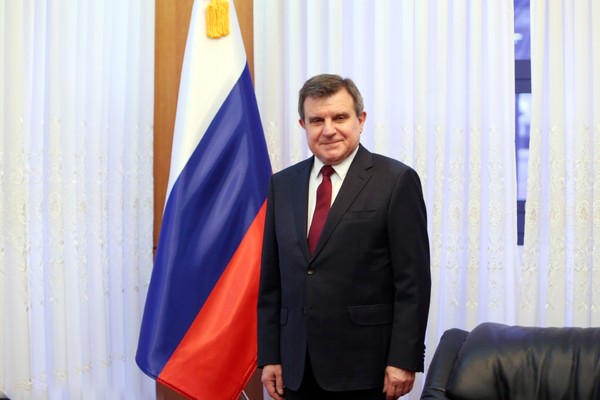
Q: What is the current volume of bilateral trade, its outlook in the next 12 months?
A: In recent years the dynamic of the bilateral trade has been positive, and its total volume approached to $25 billion. Our common goal is to increase it to $30 billion. In 2019 the Republic of Korea remained the second largest (after China) trade partner of our country in the Asia-Pacific Region. The COVID-19 epidemic and volatility in the hydrocarbon market will likely to have negative impact on
Russia-Korean bilateral trade, however, the same could be said about the world trade in general.
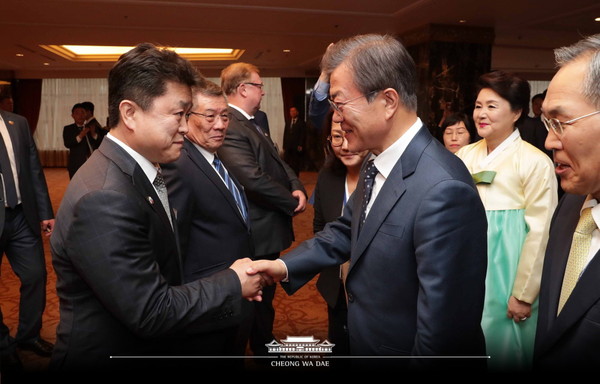
Q: What are your competitive fields of industry and products attractive to Korea and what are Korean products and services that your country might wish to import?
A: Besides oil and gas – the traditional Russian export items, we are also interested in promotion of high-tech goods and services into Korean market.
We see good prospects for cooperation in aerospace industry, including supplying to the Republic of Korea well-known products of the Russia Helicopters Holding Company, nuclear industry and ICT. I am convinced that Russian organic agriculture products would also become popular among Korean consumers after existing barriers will be removed.
We would like to import from your country a variety of goods and services. The Republic of Korea is one of the world-leading innovative economies, and Russian companies are interested in purchasing the newest products and technologies developed in your country and promoted under Smart K brand.
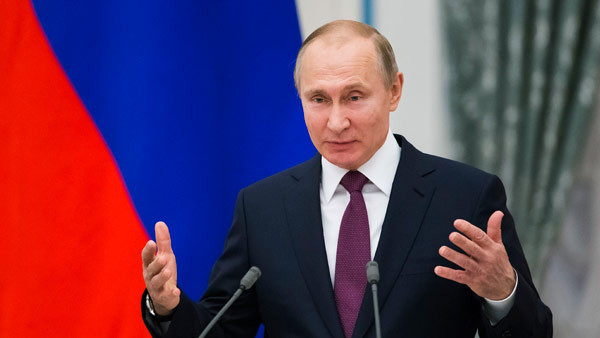
Q: What are the Korean companies actively engaged in the promotion of economic cooperation between Korea and your esteemed country?
A: Currently, the largest financial and industrial groups, such as Lotte, Hyundai motor, Samsung and LG Electronics made a huge share of Korean investments in Russian economy. But historically the first Korean investor to Russian manufacturing sector was Koya (Korea Yagurt), which opened a Ramen noodle factory in Moscow region in early 2000s. In Korea this company specializes on yogurts. One of them was sold under the brand Mechnikov named after a famous Russian microbiologist and Nobel laureate Ilya Mechnikov, who actively promoted healing characteristics of this product in the early 20th century. Nowdays Koya has two factories in Russia that produce one third of Ramen noodles in our country.
Compared to the high dynamics of bilateral trade turnover, the total accumulated Korean investment to Russian economy still remains very modest – $2.63 billion (as at the end of 2019), or 0.5% of the whole volume of the Republic of Korea’s foreign direct investment.
We hope that South Korean investors will actively participate in joint projects in the areas of priority socioeconomic development in the Russian Far East and free port of Vladivostok. In December 2019 Korean LH Corporation, Autonomous non-commercial organization ‘Agency for Foreign Investment Promotion and Export Support’ under the Ministry of Russian Federation for the Development of the Russian Far East and Arctic, and JSC ‘Corporation for the Development of the Far East’ signed an agreement on establishing an industrial complex in Nadezhdinskaya area of priority socioeconomic development in Primorsky Krai. More than 30 Korean companies have applied for investment projects as residents of this complex.
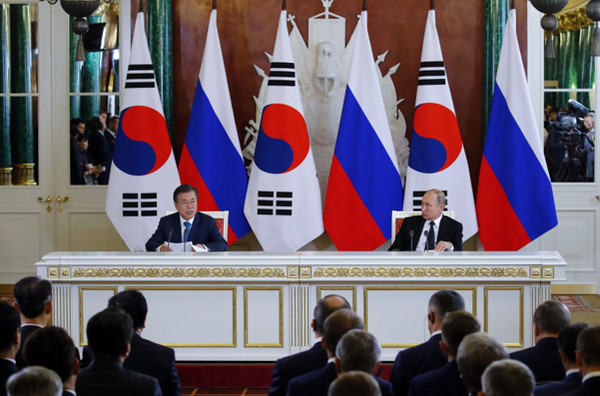
Q: What are the areas in your country where you want Korean companies to invest and what are the areas where you wish your businessmen to invest in Korea?
A: Energy sector, particularly oil and gas industry, is the most dynamically developing sphere of our cooperation. Korean market is considered as one of the main consumers of additional volumes of Russian LNG, which will be available when Dalnevostochniy LNG plant in Vladivostok, Arctic LNG-2 plant in Yamal, and the third technological line of Sakhalin-2 project become operational in 2020-2024.
Russia and Korea have established an effective cooperation in automobile industry. In December 2018 the Russian Government and Hyundai Motor signed an investment agreement, which provides for localized manufacturing of engines and automatic transmissions in Russia.
The Republic of Korea is an important logistical partner of Russia’s energy projects in Northern Sea Route area. Currently, almost all tankers to be used in this project are under construction in Korean shipyards.
We place a lot of hope in the Plan for realization of the initiative of President Moon Jae-in ‘Nine Bridges’, which was signed on February 13, 2019 in Seoul by co-chairs of the Bilateral Intergovernmental Commission, Deputy Prime Ministers Yuri Trutnev and Hong Nam-ki.
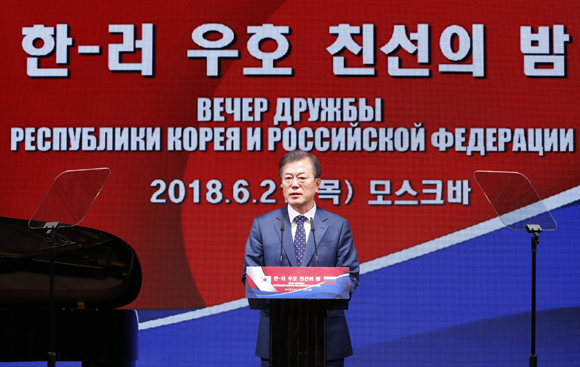
Q: Please introduce yourself in detail, including your career. What are your impressions of working in Korea?
A: As Ambassador of the Russian Federation I arrived in Seoul in August 2018. Previously, my professional activity was mostly related to China. Before my arrival to Korea I served as general director of the First Asia Department in the Russian Ministry of Foreign Affairs for many years and was in charge of the affairs of the Korean Peninsula, China and Mongolia. I visited Korea on several occasions. So I came here with a wealth of knowledge about your country, which I really like.
The age-old and rich culture of Korea cannot but cause sincere interest and sympathy for everyone who comes into contact with it. This relates equally to contemporary Korean art, literature, music, cinema and painting. The same may be said about your wonderful cuisine. In this regard, I am not an exception.
I would like to mention with satisfaction friendly feelings of South Korean citizens towards the representatives of Russia. The leadership of the Republic of Korea declares its commitment to developing comprehensive cooperation with our country. It creates favorable conditions for the fulfillment of my tasks.
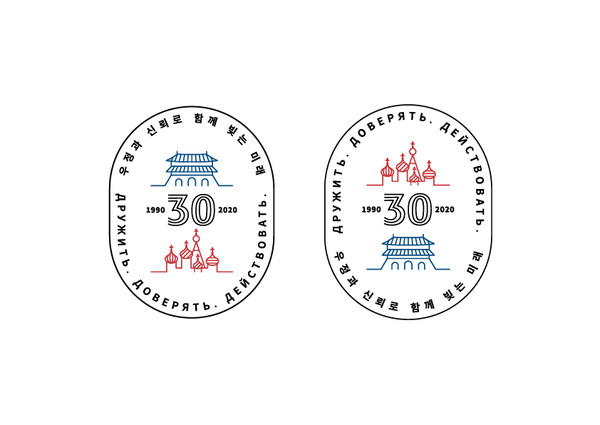
Q: What are attractive tourist destinations of your country?
A: As far as I know, Moscow and St. Petersburg, as well as Vladivostok, which is often described as the closest European city to Korea, are the most attractive tourist destinations for your compatriots. Koreans are impressed by Russia’s vast expanses that they can observe from the plane during the entire 9-hours flight from Seoul to Moscow.
For Russia lovers, who are plenty in Korea, I would definitely recommend visiting the unique nature reserves of the Kamchatka Peninsula, Baikal Lake, Altai Mountains, relaxing on the Black Sea coast near the Caucasus Mountains or in Crimea Peninsula now connected with Mainland Russia by the new Crimean bridge. Train trips from Vladivostok to Moscow are very popular among foreigners who want to know the diversity of Russia.
In this context, I would like to remind that Russia takes active steps to push ahead the project of connecting the Korean railways with the Trans-Siberian Railway. Of course, the possibility of its implementation depends on situation on the Korean peninsula. But I am firmly convinced that we can achieve progress in this direction by joint efforts. And then trains – first container, and afterwards, possibly, passenger – can depart from South Korea to Vladivostok, Moscow, St. Petersburg and further to other cities in Europe.
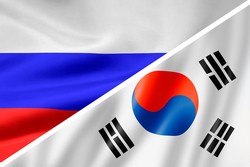
Q: The Corona disease is playing havoc to Korea and many other countries of the world. How is it in your country? And how well is it handled?
A: The COVID-19 pandemic has affected many countries, including Russia. The Russian Federation consists of 85 regions with differing epidemic situation. For the last months we succeeded in repelling three coronavirus attacks. The first one was in January when a powerful center of epidemic was in China that has a long border and intensive people exchanges with Russia. The second one we saw in the end of February when many Russian citizens returned home after spending short holidays abroad. And the third assault of COVID-19 happened in March when our compatriots started coming back from countries with serious epidemic situation.
The Russian Government has been implementing complex measures based on priority of protection of health of the Russian people in order to avoid a ‘European scenario’ of snowballing spread of infection. The main components of these measures are temporary entry-ban for foreigners (with some exceptions), suspension of regular flights, and strict sanitary-quarantine control in border crossing points for Russian citizens who are returning from abroad.
![President Moon Jae-in, center, poses for a photo with officials from South Korea and Russia at the first Korea-Russia Regional Cooperation Forum in Pohang, North Gyeongsang, on Thursday. [YONHAP]]( https://cdn.koreapost.com/news/photo/202005/20663_21017_3553.jpg)
As Russian President Vladmir Putin said in a televised address on April 2, the measures taken helped to protect elderly people from serious threat, avoid epidemic outbreak in kindergartens, schools, colleges and universities.
As for the number of infected per capita Russia in the beginning of April was in a quite favorable condition in comparison with other countries (0.3 persons per 10 thousand). Also a package of anti-recessionary policy measures is under way to support national business.
Principally important is forging international solidarity for struggle with the COVID-19 that represents a global threat. The UN and other international organization, first of all the WHO, should play a coordinative role. UN Secretary General A. Guterres supported the initiative of Russian President V. Putin who proposed to abandon unilateral sanctions and trade wars in order to ensure unimpeded delivery of food and medicines to affected countries. Unfortunately, some countries firmly rejected it.
I am confident that mutual assistance and reciprocal solidarity, abandonment of politicized approaches can only guarantee successful overcoming the consequences of COVID-19 pandemic.
